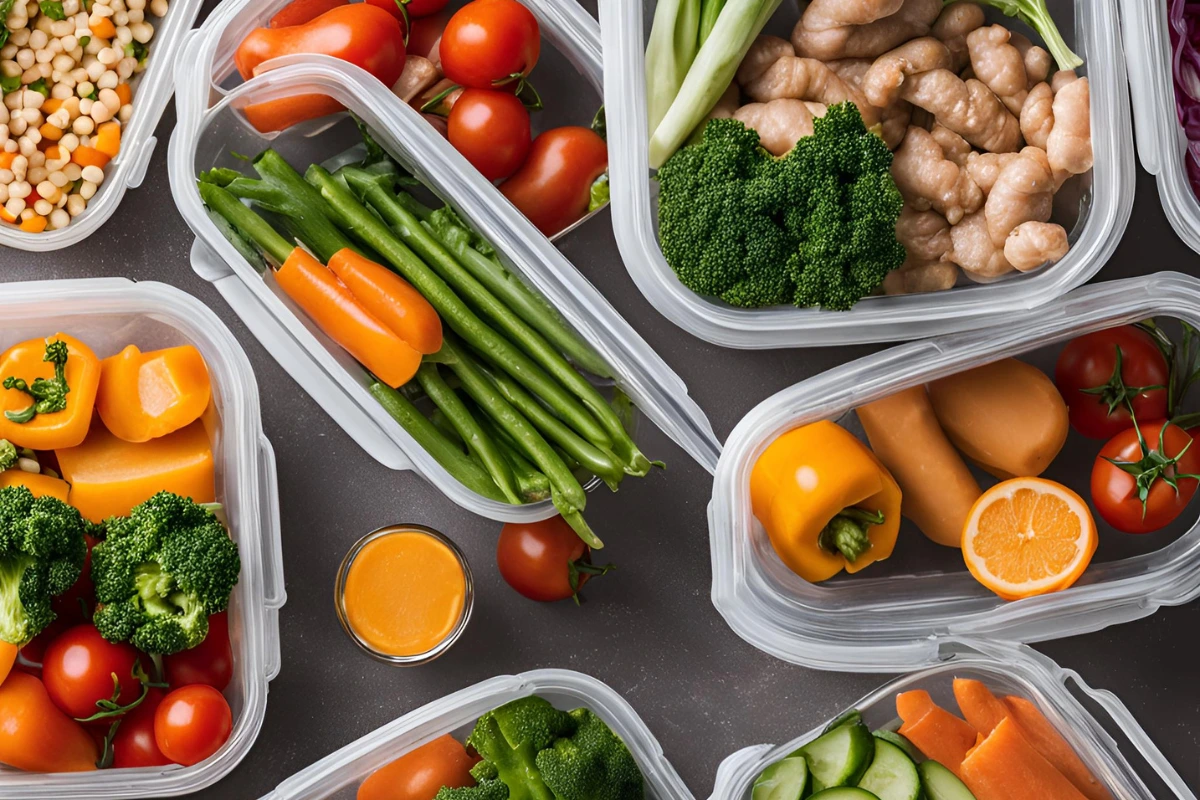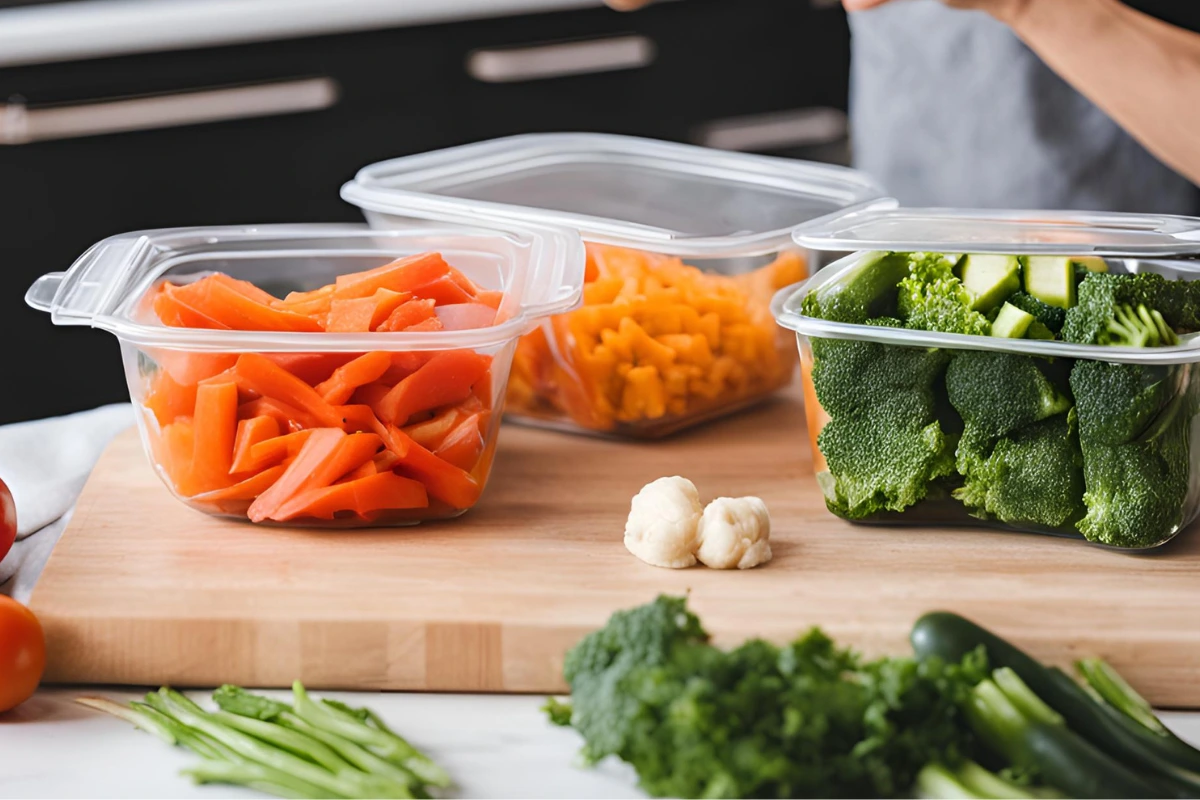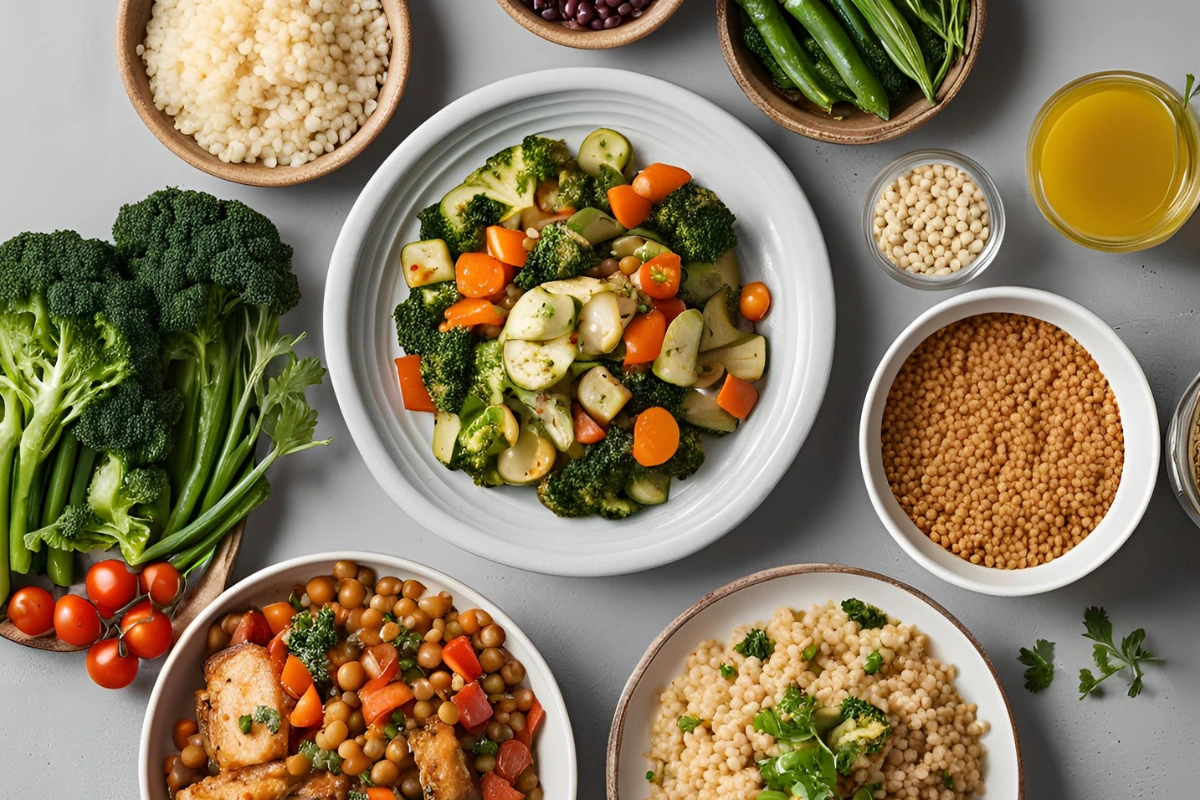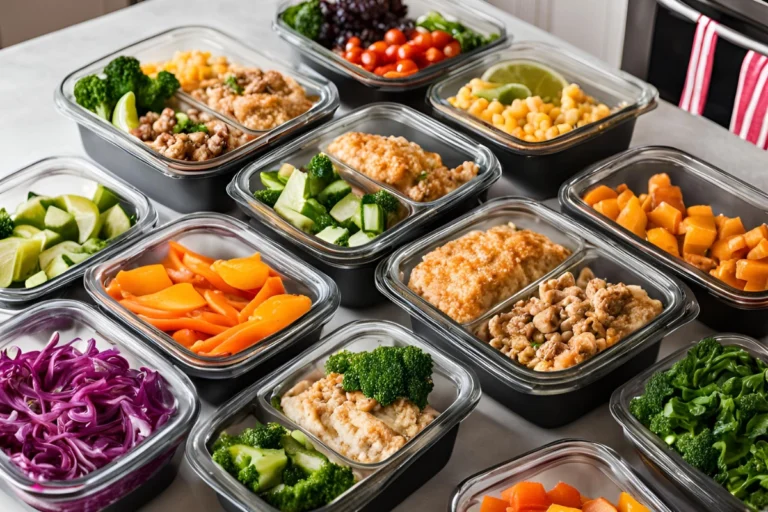Meal prepping has become increasingly popular as a way to save time and money while eating healthier. By planning cheap dinner meal prep, you can avoid the temptation of expensive takeout or unhealthy convenience foods. Meal prepping allows you to take control of your diet, portion sizes, and food budget.
Some key benefits of meal prepping include:
- Saving money by buying ingredients in bulk and reducing food waste
- Saving time during busy weeknights by having meals ready to go
- Eating healthier by controlling ingredients and portion sizes
- Reducing stress around daily meal decisions
With some simple planning and prep work, you can enjoy delicious, budget-friendly meals all week long. This guide will walk you through the basics of meal planning, provide cheap dinner meal prep and healthy recipe ideas, and offer meal prep strategies to set you up for success.
Table of Contents
Planning Basics For Cheap Dinner Meal Prep

The foundation of successful meal prepping is having a solid plan. Follow these steps to create an effective meal plan:
Set a Grocery Budget
Start by determining how much you can afford to spend on groceries each week. A good rule of thumb is to aim for $50-75 per person per week. Track your spending for a few weeks to get a baseline, then look for areas to trim costs.
Some tips for setting a realistic grocery budget:
- Review past grocery receipts and bank statements
- Factor in any dietary restrictions or preferences
- Allow some flexibility for seasonal produce changes
- Build in a small buffer for unexpected expenses
Create a Weekly Cheap Dinner Meal Prep Plan
With your budget in mind, map out your dinners for the week. Aim for a mix of proteins, grains, and vegetables across your meals. Consider incorporating:
- Meatless Monday for budget-friendly vegetarian meals
- Taco Tuesday uses affordable proteins like beans or ground turkey
- One-pot meals that stretch ingredients and minimize cleanup
- Breakfast for dinner is an inexpensive crowd-pleaser
Write out your meal plan, noting any ingredients you’ll need to buy. Be sure to account for leftovers that can be repurposed into lunches.
Make a Detailed Grocery List
Based on your meal plan, create a comprehensive grocery list organized by store section. Check your pantry and fridge first to avoid buying duplicates. Stick to your list at the store to prevent impulse purchases.
Some grocery list tips:
- Group like items together (produce, meats, dairy, etc.)
- Note the quantities needed for each item
- Include pantry staples that may need replenishing
- Allow for 1-2 “treat” items to avoid feeling deprived
Find Budget-Friendly Recipes
Look for recipes that use inexpensive ingredients and minimal specialty items. Great sources for affordable meal ideas include:
- Budget-focused food blogs and websites
- Your local library’s cookbook section
- Pinterest boards dedicated to cheap meals
- Friends and family members who are savvy cooks
Focus on versatile recipes that can be easily customized based on what’s on sale or in season.
Cheap Dinner Meal Prep and Healthy Recipe Ideas

With some smart shopping and creative cooking, you can prepare delicious meals on a tight budget. Here are some ideas for affordable, nutritious dinner recipes:
Budget-Friendly Proteins
Proteins are often the most expensive part of a meal. Save money by incorporating these cheap protein sources:
- Eggs: Scramble for breakfast-for-dinner or use in frittatas and quiches
- Beans and lentils: Great in soups, chilis, and veggie burgers
- Canned tuna or salmon: Mix into pasta salads or make fish cakes
- Chicken thighs: More flavorful and affordable than chicken breast
- Ground turkey: Use in place of ground beef in many recipes
Inexpensive Vegetables and Grains
Build meals around these nutrient-dense, budget-friendly ingredients:
- Carrots, onions, celery: The foundation for many soups and stews
- Cabbage: Shred for slaws or use in stir-fries and egg rolls
- Potatoes: Roast, mash, or use in casseroles and soups
- Frozen vegetables: Just as nutritious as fresh at a fraction of the cost
- Rice and pasta: Versatile bases for many budget-friendly meals
- Oats: Use for breakfast, homemade granola, or savory dinner dishes
One-Pot Meal Ideas
Minimize cleanup and stretch ingredients with these simple one-pot dinners:
- Chicken and Rice Skillet: Brown chicken thighs, then simmer with rice, broth, and veggies.
- Bean and Vegetable Soup: Simmer canned beans with frozen veggies and broth for a hearty meal.
- Chili Mac: Combine ground turkey, pasta, canned tomatoes, and beans for a twist on chili.
- Fried Rice: Use leftover rice with frozen veggies and eggs for a quick stir-fry.
- Skillet Lasagna: Layer noodles, sauce, and cheese in a skillet for an easier lasagna.
Sheet Pan and Casserole Recipes
These hands-off cooking methods are perfect for busy weeknights:
- Sheet Pan Sausage and Veggies: Roast sliced sausage with potatoes and your favorite vegetables.
- Tuna Noodle Casserole: Mix canned tuna, pasta, and frozen peas with a creamy sauce.
- Chicken Fajita Bake: Layer chicken, peppers, and onions with Mexican seasonings.
- Loaded Baked Potato Casserole: Combine cubed potatoes with cheese, bacon, and green onions.
- Roasted Vegetable Medley: Toss seasonal veggies with olive oil and herbs for an easy side dish.
Batch Cooking and Repurposing Leftovers
Maximize your efforts by cooking larger portions and reimagining leftovers:
- Roast a whole chicken, then use leftovers for sandwiches, salads, and soups
- Make a big pot of chili, serving some over baked potatoes and some in tortillas
- Cook extra rice to use in stir-fries or rice pudding later in the week
- Prepare a large batch of tomato sauce to use on pasta, pizza, and casseroles
With these recipe ideas and strategies, you’ll be well on your way to creating cheap and delicious meal preps for the week ahead.
Cheap Dinner Meal Prep Strategies

Now that you have your meal plan and recipes, it’s time to put your prep into action. Follow these strategies to efficiently prepare your meals for the week:
Prepare Ingredients in Advance
Set aside time on the weekend to prep ingredients for easy assembly during the week:
- Wash and chop vegetables for snacks and recipes
- Cook and portion grains like rice, quinoa, or pasta
- Roast a large batch of vegetables to use in various meals
- Mix spice blends and sauces to quickly add flavor to dishes
Store prepped ingredients in clear containers or bags for easy access.
Cook Larger Batches
Make the most of your cooking time by preparing extra portions:
- Double soup and stew recipes to freeze for later
- Roast two sheet pans of vegetables instead of one
- Make a large batch of meatballs to use throughout the week
- Prepare extra chicken or ground meat to repurpose in different meals
Portion and Store Meals Properly
Invest in quality meal prep containers to keep food fresh and easily transportable:
- Use glass containers for reheating in the microwave
- Choose containers with divided compartments for balanced meals
- Opt for leak-proof options if transporting soups or sauces
- Label containers with contents and dates for easy grab-and-go
Quick Reheating and Assembly Tips
Make weeknight dinners a breeze with these strategies:
- Keep pre-cooked proteins on hand for fast salads and grain bowls
- Prep “meal kits” with portioned ingredients ready to cook
- Use a programmable slow cooker to have meals ready when you get home
- Keep a well-stocked pantry for last-minute meal additions
By implementing these meal prep strategies, you’ll save time and reduce stress around weeknight dinners.
Save Money and Time with Cheap Dinner Meal Prep
cheap dinner meal prep offers significant benefits for both your wallet and your schedule:
Cost Savings
By planning and cooking at home, you can dramatically reduce your food expenses:
- Reduced food waste: Use ingredients more efficiently across multiple meals
- Fewer impulse purchases: Stick to your grocery list and avoid costly convenience foods
- Bulk buying opportunities: Purchase frequently used items in larger quantities at lower prices
- Less eating out: Resist the temptation of takeout with ready-to-eat meals at home
Many people report saving 30-40% on their food budgets by meal prepping consistently.
Time-Saving Benefits
While meal prepping requires an upfront time investment, it pays off throughout the week:
- Streamlined grocery shopping: Get in and out quickly with a planned list
- Batch cooking efficiencies: Prep multiple meals at once for economy of scale
- Minimal weeknight cooking: Reheat or quickly assemble pre-prepped ingredients
- Reduced decision fatigue: Eliminate daily “What’s for dinner?” stress
Estimate saving 5-10 hours per week by meal prepping instead of daily cooking.
Customizing for Individual Needs
Meal prepping allows you to cater to specific dietary requirements and preferences:
- Portion control: Pre-portion meals to support weight management goals
- Dietary restrictions: Easily accommodate allergies or special diets
- Balanced nutrition: Ensure a good mix of proteins, carbs, and vegetables in each meal
- Variety: Prep different options to prevent boredom and meet family preferences
With practice, you’ll develop a personalized meal prep routine that works for your lifestyle and budget.
Frequently Asked Questions (FAQ)
Q: How long do meal preps last in the refrigerator?
A: Most meal preps will last 3-5 days in the refrigerator. Use your best judgment and check for signs of spoilage before eating. Some foods, like cut fruits and leafy greens, may have a shorter shelf life.
Q: Can I freeze meal preps for longer storage?
A: Many meal preps freeze well for 2-3 months. Soups, stews, casseroles, and cooked grains tend to freeze best. Avoid freezing meals with raw vegetables or dairy-based sauces, as the texture may change upon thawing.
Q: What are some tips for keeping meal preps fresh and flavorful?
A: To maintain freshness:
- Store sauces and dressings separately until ready to eat
- Add fresh herbs or a squeeze of lemon just before serving
- Use airtight containers to prevent the absorption of fridge odors
- Reheat foods properly to maintain texture and taste
Q: How can I meal prep for a family with different dietary restrictions?
A: Try these strategies:
- Prep a variety of mix-and-match components
- Make a base meal that can be customized individually
- Use divided containers to keep ingredients separate
- Label meals clearly to avoid confusion
Q: How do I incorporate variety into my meal preps to avoid boredom?
A: Keep things interesting by:
- Rotating through different cuisines and flavor profiles
- Trying new recipes or ingredients every few weeks
- Repurposing leftovers in creative ways (e.g., turning roast chicken into chicken salad)
- Allowing for some flexibility in your meal plan for spontaneity
By following these meal prep strategies and tips, you’ll be well on your way to enjoying cheap, delicious, and stress-free dinners throughout the week. With practice, meal prepping will become second nature, saving you time and money while supporting your health and nutrition goals.
For more budget-friendly dinner ideas, check out my Easy Dinner Meal Prep Guide.
Looking for comforting meals on a budget? Try my Comfort Food Meal Prep Recipes.

